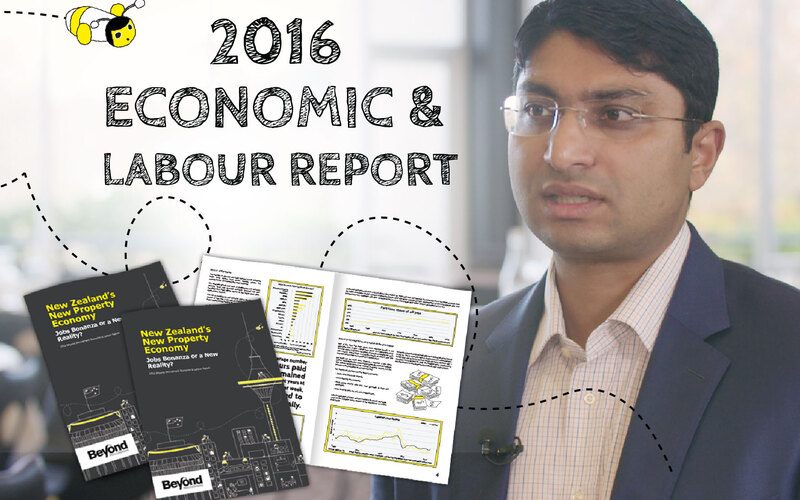As part of our 2016 Beyond Recruitment Economic & Labour Report launch we’re delighted to speak with Economist, Shamubeel Eaqub. Shamubeel expands on his insights within the report across a number of topics, including recent employment trends, the immediate and long-term economic outlook, and the impact of our ‘new property economy’ on the labour market.
Growing Pains
Shamubeel believes that dealing with growth is the biggest challenge facing the New Zealand economy at the moment. Although strong population growth is underpinning our economic development, Shamubeel says that the recovery is uneven across the country.
“The risk for a lot of businesses is that if you look at the headline level, you might get a false sense of how strong or weak the economy might be,” said Shamubeel. “We are seeing some places that are not really recovering and other places that are recovering much faster, and are seeing significant skill shortages.”
Though we can often look internationally to solve many issues when it comes to skill shortages, Shamubeel comments that migration hasn’t been able to keep up with the fast-changing job market, driven by the gig economy.
A Changing Landscape
With the digital revolution making its mark and a new generation moving into the job market, the economy has become very polarised. Some sectors are seeing strong growth (Property, ICT) whilst others are a lot slower (Manufacturing, Agriculture). However, Shamubeel says that it’s important to understand the difference between structural growth and cyclical growth.
“Each industry seems to have its own little drivers. Some of them are structural and some of them are cyclical,” says Shamubeel. “With an industry like ICT, that’s very much a structural trend of improvement, which will persist for many decades to come. The very strong growth in Property, and Financial Services, I think is much more cyclical. It is about that very strong growth in prices, very strong growth in borrowing, which is fuelling each other. We don’t know when it might end, but I think it will end, and when that ends those jobs that have been very lucrative until now will disappear.”
Because of this, robust talent management functions will become key. This is why Shamubeel believes that HR should have a seat at the executive table. “Ultimately what we’re talking about is not a payrolls job. We’re talking about somebody who’s going to look after the long term needs of talent for your business. The most resource business that any business has.”
Regional Insight
There has also been a lot of change regionally. Auckland, with its skyrocketing property market, has seen the brunt of this. After seeing a huge growth in population, it’s become apparent that the city’s economy and infrastructure can’t keep up – risking a loss of jobs. However, for other areas of New Zealand, Auckland’s pain could be their gain. Companies may see that spreading their services can result in a better quality of life for their employees, which could promote growth in areas like Hamilton, Tauranga, and specifically Wellington.
“Given that Auckland’s struggling to cope with the amount of growth it has, Wellington should be marketing itself as the alternative; as the cool little capital that can do it,” says Shamubeel, “The big challenge is around career prospects, and the potential growth that you might have. Wellington’s never grown nearly as fast as Auckland has, it doesn’t have the scale…but the reality is when you’re spending many hours on traffic, and so much of your income is going towards mortgage payments, Wellington is a very attractive alternative.”
Another city looking to find its place in the economy is Christchurch. With the Christchurch rebuild, which was previously such a significant economic driver, starting to come off of its peak, Shamubeel believes that the Garden City still has some uncertain times ahead of it. “We’re now getting into the sharp end of the recovery. This is all about the underlying economy, the real economy of Canterbury coming back. Unfortunately, that’s still quite slow and it’s quite gradual. So we’re likely to face a few bumpy years over the next three to four years, I think.”
Final Thoughts
To watch our full interview with Shamubeel, please click on the video at the top of the page. Thanks to Shamubeel once again for joining us, and lending his economic expertise to our Beyond Recruitment Economic & Labour Report.
In the Beyond Recruitment Economic & Labour Report, Shamubeel goes into more detail on the new property economy, its effects on the regions, and how recent economic movements have impacted the job market. The report also features insights from Beyond Recruitment CEO, Liza Viz; General Manager, Ben Pearson. To secure a copy for yourself, please get in touch.
Follow this link to access your digital copy of the 2016 Beyond Recruitment Economic & Labour Report.




